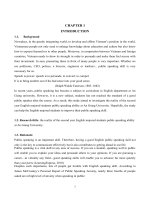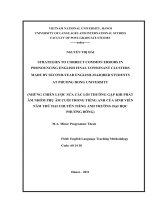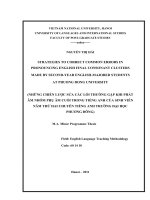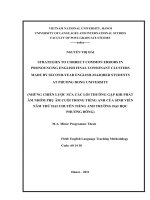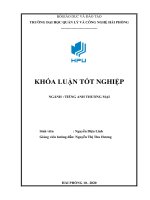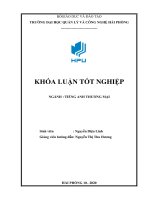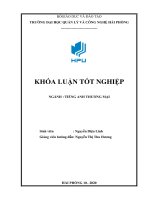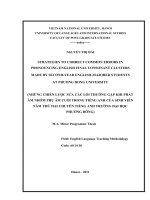Difficulties facing vnuas second year english majored students in speaking 4 lessons
Bạn đang xem bản rút gọn của tài liệu. Xem và tải ngay bản đầy đủ của tài liệu tại đây (995.66 KB, 53 trang )
VIET NAM NATIONAL UNIVERSITY OF AGRICULTURE
FACULTY OF EDUCATION AND FOREIGN LANGUAGES
BA THESIS
DIFFICUTIES FACING VNUA’S SECOND- YEAR
ENGLISH MAJORED STUDENTS IN SPEAKING 4
LESSONS
NHỮNG KHĨ KHĂN CỦA SINH VIÊN NĂM HAI
CHUN NGÀNH NGƠN NGỮ ANH TRONG CÁC GIỜ
HỌC NÓI 4
Student: DOAN THI HAI YEN
Student code: 621281
Major: ENGLISH LINGUISTICS
Supervisor: NGUYEN THI LAN ANH, M.A
HANOI – 2021
VIET NAM NATIONAL UNIVERSITY OF AGRICULTURE
FACULTY OF EDUCATION AND FOREIGN LANGUAGES
BA THESIS
DIFFICUTIES FACING VNUA’S SECOND- YEAR
ENGLISH MAJORED STUDENTS IN SPEAKING 4
LESSONS
NHỮNG KHĨ KHĂN CỦA SINH VIÊN NĂM HAI
CHUN NGÀNH NGƠN NGỮ ANH TRONG CÁC GIỜ
HỌC NÓI 4
Student: DOAN THI HAI YEN
Student code: 621281
Major: ENGLISH LINGUISTICS
Supervisor: NGUYEN THI LAN ANH, M.A
HANOI – 2021
CERTIFICATE OF ORIGINALITY
I, the undersigned, hereby certify my authority over the study project report
titled "Difficulties facing VNUA's second-year English-majored students in
speaking 4 lessons." submitted as partial fulfillment of the requirements for the
Bachelor of English Language degree Except where noted, no other person's
work has been utilized in the text of the thesis without proper attribution.
Hanoi, 2021
Doan Thi Hai Yen
Approved by
SUPERVISOR
Date: ……………………
i
ACKNOWLEDGMENT
This Thesis is the result of an end of a long way: the end of the English
language Course. It would not have been possible without the participation and
assistance of numerous brave and courageous people along the way. Thus I have
to thank them all.
First and foremost, I'd like to express my gratitude to MA. Nguyen Thi Lan
Anh, who served as my supervisor and instructor during this thesis. For the last
months, she has been devotedly guiding me, advising me on what I should and
should not include in this thesis; she is a guide to lead me so that I may complete
my thesis flawlessly. Not only that, but she also imparted to me her experiences
in the process of working. Those are the extremely valuable practical knowledge
that I learn in this process do a thesis, these practical things will be the luggage
in the educational path that I have.
Through this thesis study, I would like to express my heartfelt gratitude to
the Vietnam National University of Agriculture's Board of Directors, the
Department of Organization and Training, and the leaders of the Faculty of
Education and Foreign Languages for allowing me to participate in the research
for this thesis.
I would like to thank my university teachers for creating the best conditions
for my thesis.
In particular, I wish to express special thanks to my parents for their support
and the flexibility that they have enabled me, especially to my mother who brought
me up and went so far, to overcome a lot of hurdles, including financial assistance,
that they have provided me over the entire field training time.
ii
I extend my gratitude to my teammates especially to my group study, with
whom I shared my dark days and together we sort out academic and social
problems.
Lastly, specials thanks must be given to all students from K64, who joined
my survey and interview for their feedback and attention during the survey with
which I learned a good lesson about the difficulties of learning speaking 4,
causes and suggestions, and to complete this thesis.
I would like to thank all those who made this thesis possible and become a
reality with their kind assistance.
Thank you sincerely!
Hanoi, July 2021
Doan Thi Hai Yen
iii
TABLE OF CONTENTS
CERTIFICATE OF ORIGINALITY............................................................................ i
ACKNOWLEDGMENT .............................................................................................. ii
TABLE OF CONTENTS ............................................................................................ iv
ABSTRACT ................................................................................................................. vi
LIST OF TABLE AND CHART .............................................................................. viii
PART 1: INTRODUCTION .........................................................................................1
1.
RATIONALE FOR THE STUDY .......................................................................1
2.
AIMS AND OBJECTIVES OF THE STUDY....................................................2
3.
RESEARCH QUESTIONS ..................................................................................2
4.
SCOPE OF THE STUDY .....................................................................................2
5.
SIGNIFICANCE OF THE STUDY .....................................................................3
6.
DESIGN OF THE STUDY...................................................................................3
PART 2: DEVELOPMENT ..........................................................................................5
CHAPTER 1: LITERATURE REVIEW .....................................................................5
1.1. REVIEW OF THE PREVIOUS STUDIES ................................................... 5
1.2. REVIEW OF THEORETICAL BACKGROUND ..............................................6
1.2.1. Definition of English speaking skill ...................................................................9
1.2.2. The importance of English speaking skill ....................................................... 10
1.2.3. General outline of a speaking lesson ............................................................... 12
1.2.4. What a good speaker does ................................................................................ 12
CHAPTER 2: METHODOLOGY ............................................................................. 15
2.1. RESEARCH METHODOLOGY ....................................................................... 15
2.2. RESEARCH SETTING ...................................................................................... 15
2.3. DATA COLLECTION ........................................................................................ 16
2.3.1. Data collecting instrusments ............................................................................ 16
iv
2.3.1.1. The survey questionnaire............................................................................... 16
2.3.1.2. An interview ................................................................................................... 17
2.3.2. Data collection procedures ............................................................................... 17
2.4. DATA ANALYSIS ............................................................................................. 18
CHAPTER 3: FINDING AND DISCUSSION ........................................................ 19
3.1. FINDINGS ........................................................................................................... 19
3.1.1. The survey results from the questionnaire....................................................... 19
3.1.2. Results from the interview................................................................................ 27
3.1.2.1. Kinds of Student’s Difficulties in Speaking................................................. 27
3.1.2.2. Kinds of Causes of Difficulty in Speaking................................................... 28
3.1.2.3. Kinds of Student’s Efforts in Speaking. ....................................................... 29
3.1.3. Suggestions on improving the students’ English speaking performance ...... 31
3.2. DISCUSSION ...................................................................................................... 32
3.3. SUMMARY ......................................................................................................... 32
PART C: CONCLUSION .......................................................................................... 34
1. RECAPITULATION ...................................................................................... 34
2. CONCLUDING REMARKS ................................................................................. 35
3. LIMITATIONS OF THE STUDY .................................................................. 36
4. RECOMMENDATIONS FOR FURTHER STUDY........................................... 37
REFFERENCES ......................................................................................................... 38
APPENDIXES ............................................................................................................ 41
v
ABSTRACT
English is an international language common to all countries across the
world. English is a vital item for everyday conversation to be learned and
practiced. In English, Speaking is one of the most important skills to be
enhanced as means of effective communication, and it is regarded as one of the
most difficult aspects of language learning.
The focal point of this thesis is to find out the difficulties facing the secondyear English- majored in speaking lessons, with the objectives focusing on some
suggestions to improve their English skills in general and English speaking
skills in particular. 60 students were participated in completing the
questionnaires and 10 out of sixty students were interviewed to get to know
more about their problems in speaking English class, the causes, and efforts they
have made to improve their English speaking performance.
The initial results revealed that the most reason for the students facing
difficulties were two sorts of problems namely linguistic problems and nonlinguistic problems. Supported the finding, the hypothesis of the study was
formed. Possible measures are proposed to tackle such challenges in helping
students speak English more effectively. Practice makes perfect, encouraging
the students to talk English, giving them plenty of chances to talk, using English
at school, asking them to form English speaking environment, and applying
solutions studied. The evaluation of the action plan revealed that the student's
motivation significantly improved after the action plan implementation.
Supported this finding, further recommendations, and deeper implications are
provided.
vi
LIST OF ABBREVIATION
VNUA: Vietnam National Unitversity of Agriculture
ESL: English as a Second Language
EFL: English as a Foreign Language
CLT: Communicative Language Teaching
ELTIN: English Language Teaching in Indonesia
vii
LIST OF TABLE AND CHART
Table 1. Difficulties facing the second-year English majored students in learning
English speaking from their own perspective. .................................................... 19
Chart 3.1: The percentage of students faced the difficulty of Pronunciation ..... 21
Chart 3.2: The percentage of students lack of vocabulary .................................. 21
Chart 3.3: The percentage of students grammart mistakes Error! Bookmark not
defined.
Chart 3.4: The percentage of students lack of confidence .................................. 23
Chart 3.5: The percentage of students lack of motivation .................................. 23
Chart 3.6: The percentage of students anxiety about speaking ........................... 24
Chart 3.7: The percentage of students shyness ................................................... 24
viii
PART 1: INTRODUCTION
1.
RATIONALE FOR THE STUDY
English is international language, which is often utilized by all of country
within the world. In many country within the world, English is taught from the
kindergarten until the university. English is that the most significant foreign
language to transfer and find of data, science, technology, art and culture and
establish international relationship. English is that the important thing to be
learned and practiced for speaking in daily communication.
In English, there are four skills that ought to be mastered, they are:
listening, speaking, reading, and writing. Speaking is one of the foremost
important skills to be enhanced as means of effective communication, and it's
regarded one among the foremost difficult aspects of acquisition. Many
language learners find it difficult to precise themselves in voice communication.
They're generally facing problems to use the foreign language to precise their
thoughts effectively. They stop talking because they face psychological
obstacles or cannot find the acceptable words and expressions. I realize that the
second- year students have certain difficulties in speaking skill. What I said
above could be example and it build up in my mind that problems of the
scholars once they study speaking.
For the above mentioned reasons, I would like to write my graduation paper
about what has inspired me to practice my English as well as the method of
teaching to speak with the aim of identifying DIFFICULTIES FACING
VNUA’S SECOND- YEAR (K64) ENGLISH- MAJORED STUDENTS IN
SPEAKING LESSONS, which is also the title of this Graduation Paper.
1
2. AIMS AND OBJECTIVES OF THE STUDY
This study is aimed at finding out the difficulties facing the second-year
students’ English speaking performance, causes with the objectives focusing on
some suggestions to improve their English skills in general and English
speaking skill in particular.
- Investigate the current situation of learning and teaching speaking in
VNUA
- Find out what difficulties the second-year students in VNUA meet when
they learn to speak
- Suggest some realistic and appropriate techniques to help improve the
teaching and learning to speak in VNUA
Within my reach of understanding, I would only like to go through the
Literature Review of speaking, the common strategies to improve the students’
English speaking skill, then I would like to give the methodology of the study
research, which is a research survey, to find out “Difficulties facing VNUA’s
second-year English- majored students in speaking lesson.”
3. RESEARCH QUESTIONS
The study is carried out to find out the answers for the following questions:
- What are the difficulties facing VNUA’s second- year (K64) English
majored students in learning speaking?
- What are causes leading to difficulties in learning speaking 4 skill of
the second- year (K64) students in VNUA?
- What are solutions on improve to the problems?
4. SCOPE OF THE STUDY
The VNUA’S second- year (K64 include of 132 ststuden: K64ENGA- 23
students, K64ENGB- 27 students, K64ENGC- 29 students, K64ENGD- 25
students, K64ENGE- 28 students ) English- majored student in speaking,
2
The researcher noticed that the K64 students had many difficulties and
problems in learning how to speak. So this graduation paper focuses on the
survey and interview of students of K64
Based on the questionnaire of Nguyen Thi Thanh Tam written in 2019. The
researcher make up the questionnaire to ask for the students’ opinions on
difficulties facing them in speaking lessons and the causes behind those
difficulties. Basing on the questionnaire results, the researcher gave out some
suggestions on improving the students’ English speaking performance.
5. SIGNIFICANCE OF THE STUDY
In this study, the researcher tends to overview the difficulties the secondyear (K64) English- majored students in VNUA face when learning speaking,
causes and to suggest some possible solutions to the problems in order to help
students learning speaking English better.
6. DESIGN OF THE STUDY
The Graduation Paper is divided into 3 main parts: Introduction,
Development& Findings and Discussion
PART 1: INTRODUCTION
1. RATIONALE FOR THE STUDY
2. AIMS AND OBJECTIVES OF THE STUDY
3. RESEARCH QUESTIONS
4. SCOPE OF THE STUDY
5. SIGNIFICANCE OF THE STUDY
6. DESIGN OF THE STUDY
PART 2: DEVELOPMENT
CHAPTER 1: LITERATURE REVIEW
1.1. PREVIOUS STUDIES
1.2. REVIEW OF THEORETICAL BACKGROUND
1.2.1. Definition of English speaking skill
3
1.2.2. The importance of English speaking skill
1.2.3. General outline of a speaking lesson
1.2.4. What a good speaker does
CHAPTER 2: METHODOLOGY
2.1. RESEARCH METHODOLOGY
2.2. RESEARCH SETTING
2.3. DATA COLLECTION
2.4. DATA ANALYSIS
CHAPTER 3: FINDINGS AND DISCUSSION
3.1. FINDINGS
3.1.1. The survey results from the questionnaire
3.1.2. Results from the interview
3.1.3. Suggestions on improving the students’ English speaking performance
3.2. DISCUSSION
3.3. SUMMARY
PART 3: CONCLUSION
1. RECAPITULATION
2. CONCLUDING REMARKS
3. LIMITATIONS OF THE STUDY
4. RECOMMENDATIONS FOR FURTHER STUDY
REFFERENCES
APPENDEXES
4
PART 2: DEVELOPMENT
CHAPTER 1: LITERATURE REVIEW
1.1 . REVIEW OF THE PREVIOUS STUDIES
Speaking is a crucial part of second language learning and teaching.
Despite its importance, for many years, teaching speaking has been undervalued
and English language teachers have continued to teach speaking just as a
repetition of drills or memorization of dialogues. However, today's world
requires that the goal of studying speaking should improve students'
communicative skills, because, only in that way, students can express
themselves and learn how to follow the social and cultural rules appropriate in
each communicative circumstance. That’s why, there have been a lot of studies
on English speaking skill, include:
(1) Speaking problems faced by EFL learners in individual presentation by:
NIHAYATUL HIMMAH in 2018 the aim of this is to explain the speaking
problems faced by EFL learners in the learning process in an individual
presentation at fourth semester English department students of UIN Walisongo
Semarang in the academic year 2017/2018.
(2) Problems and Difficulties of Speaking That Encounter English Language
Students at Al Quds Open University by Dr. Ahmed Maher Mahmoud Al
Nakhalah ịn December 2016, the aim improving and developing students' skills,
techniques and procedures of speaking so as to enrich and assist the students’
ability of speaking skills. To enable students to learn a wide range of speaking
skills, including how to speak accurately and proficiently. To bring and draw
students to a level of practical proficiency that will enable them to be
linguistically and analytically equipped to complete extended speaking skills
and increasing their confidence in practicing speaking skills.
5
(3) How to promote speaking skills for 7 th graders at Bach Dang secondary
school in Haiphong by Le Thi Thu Hang from Haiphong private university
foreign languages department to help the 7" graders at Bach Dang secondary
school improve their speaking skill through extra-activities and to prepare for
them to the basic knowledge of speaking skill with higher requirement for the
next graders, the study suggests some effective activities that can be applied in
Bach Dang secondary to promoting students speaking skills.
(4) Investigating the effect of using Role-play in teaching speaking English for
grade 10 students at high school by Nguyen Huong Giang 2015 from Thai
Nguyen University investigated the effect of role-play and simulation approach
on Malaysian Polytechnic engineering students’ ESL oral communication skills.
In addition, the study examined the students’ perceptions of the effect of the
role-play and simulation on their oral communication skills;
(5) A study on extra activities to improve English speaking skill of QTTN class
at Haiphong private University by Ta Thi Minh Phuong 2017 aims at finding
out problems and expectations in English speaking lessons. Moreover, some
suggestions on appreciate techniques to study English speaking have been given.
Hopefully, students will be interested in learning English speaking. So that they
will pay much attention to the lectures and get better results;
(6) The effectiveness of role play in teaching speaking written in ELTIN journal,
Volume 3/II, October 2015 by Lilis Suryani on He
mentioned the way of improving students speaking skill. He said that teacher
should find the appropriate technique of teaching speaking. It means that teacher
plays an important role to create interesting teaching and learning process. In
this research, the researcher would like to choose role play to solve the problem
of speaking.
1.2. REVIEW OF THEORETICAL BACKGROUND
6
The Nature of Speaking Skill
It is mentioned in the literature that, naturally, to speak means to produce
some words representing one’s ideas. It is a process of building and sharing
meaning through the use of verbal and non-verbal symbols, in a variety of
contexts (Chaney, 1998 in Kayi, 2006).
In line with this issue, there have been some relevant researches conducted.
Burns and Joyce in Nunan (1999); Schwartz (2005); and Thornbury (2005)
argue that psychological factors such as anxiety or shyness, lack of confidence,
lack of motivation, and fear of mistakes are the factors commonly that hinder
students from speaking.
Another study conducted by Koichi Sato (2003) finds that students of
English are not highly competent in speaking because of their fear of making
mistakes. The same finding is also shared by another research conducted by
Ballard (1996, in JIN Yan-Hua, 2007) who finds that students fail to join in the
English discussion because of their vocabulary problems and fear of making
mistakes resulting in their inability to speak English well. In addition, she says
that students find speaking English a stressful activity especially if they have to
perform something using English. The finding above confirms the results of this
study as will be explained in part of the result findings.
Communicative Language Teaching
Richards & Rodgers (2001, p.167) also affirm that CLT is associated with
its learner- centred and experienced-based tasks view of second language
teaching. In the CLT context, learners are seen as active participants in the
construction of knowledge, rather than passive recipients of information
provided by the teacher or the textbook. In contrast, language teachers are no
longer viewed as the authority of the knowledge, playing a dominant role.
Rather, they share different roles such as communication facilitator, independent
participant, needs analyst, counsellor, and group process manager to create more
7
fascinating experiences for the learners. Besides the above features, Richards &
Rodgers (2001) also describe other significant characteristics of this approach
including its efforts to make tasks and language relevant to a target group of
learners through an analysis of genuine, realistic situations, its emphasis on the
use of authentic, from-life materials, and its attempt to create a secure, nonthreatening atmosphere
Teaching of Speaking
The use of English as a second language (ESL) or foreign language (EFL)
in oral communication is, without a doubt, one of the most common but highly
complex activities necessary to be considered when teaching the English
language especially because we ―live at a time where the ability to speak
English fluently has become a must, especially who want to advance in certain
fields of human endeavor‖ (AlSibai,2004).
The focus of teaching speaking, of course, is to improve the oral production
of the students. Therefore, language teaching activities in the classroom should
aim at maximizing individual language use (Haozhang, 1997). In the past, oral
communication instruction was neglected because of the misconception that oral
communication competence develops naturally over time and that the cognitive
skills
involved
in
writing
automatically
transfer
to
analogous
oral
communication skills (Chaney, 1998). However, Ur (1996) considered speaking
as the most important skill among four skills (listening, speaking, reading, and
writing) because people who know a language are referred to as speakers of that
language. This indicates that using a language is more important than just
knowing about it because ―there is no point knowing a lot about language if
you can’t use it‖ (Scrivener,2005)
Factors that Cause Speaking difficulties to EFL Learners Zhang (2009)
argued that speaking remains the most difficult skill to master for the majority of
English learners, and they are still incompetent in communicating orally in
8
English. According to Ur (1996), there are many factors that cause difficulty in
speaking, and they areas follows: 1.Inhibition. Students are worried about
making mistakes, fearful of criticism, or simply shy. 2.Nothing to say. Students
have no motive to express themselves. 3.Low or uneven participation. Only one
participant can talk at a time because of large classes and the tendency of some
learners to dominate, while others speak very little or not at all.
1.2.1. Definition of English speaking skill
Speaking is an act of making vocal sounds. We can say that speaking
means to
converse,
or
expressing
one's
thoughts
and
feelings
in spoken language. To speak often implies conveying information. Speaking
skills are the skills that give us the ability to communicate effectively. (Hopkins,
David. 1993)
Speaking is an interactive process of constructing meaning that involves
producing and receiving and processing information (Brown, 1994). Its form
and meaning are dependent on the context in which it occurs, including the
participants themselves, their collective experiences, the physical environment,
and the purposes for speaking. It is often spontaneous, open-ended, and
evolving. However, speech is not always unpredictable. Language functions (or
patterns) that tend to recur in certain discourse situations (e.g., declining an
invitation or requesting time off from work), can be identified and charted
(Burns & Joyce, 1997). For example, when a salesperson asks "May I help
you?" the expected discourse sequence includes a statement of need, response to
the need, offer of appreciation, acknowledgement of the appreciation, and a
leave-taking exchange.
Speaking requires that learners not only know how to produce specific
points of language such as grammar, pronunciation, or vocabulary (linguistic
competence), but also that they understand when, why, and in what ways to
produce language (sociolinguistic competence). Finally, speech has its own
9
skills, structures, and conventions different from written language (Burns &
Joyce, 1997). A good speaker synthesizes this array of skills and knowledge to
succeed in a given speech act.
(AlSibai, 2004, p.3).
The teaching of Speaking The use of English as a second language (ESL) or
foreign language (EFL) inoral communication is, without a doubt, one of the
most common but highly complex activities necessary to be considered when
teaching the English language especially because we ―live at a time where the
ability to speak English fluently has become a must, especially who want to
advance in certain fields of human endeavor (AlSibai, 2004, p.3).
The focus of teaching speaking, of course, is to improve the oral production
of the students. Therefore, language teaching activities in the classroom should
aim at maximizing individual language use (Haozhang, 1997). In the past, oral
communication instruction was neglected because of the misconception that oral
communication competence develops naturally over time and that the cognitive
skills
involved
in
writing
automatically
transfer
to
analogous
oral
communication skills (Chaney, 1998). However, Ur (1996) considered speaking
as the most important skill among four skills (listening, speaking, reading, and
writing) because people who know a language are referred to as speakers of that
language. This indicates that using a language is more important than just
knowing about it because ―there is no point knowing a lot about the language if
you can’t use it (Scrivener, 2005, p.146).
1.2.2. The importance of English speaking skill
After all, the most effective way to communicate is through speech.
Thus, speaking skills are a vitally important method of communication. The
four language skills of listening, speaking, reading, and writing are all
10
interconnected. ... When one thinks of speaking skills, one tends to think of it as
a common skill. While a picture may be worth a thousand words, those words
will no doubt come in handy if the picture is distorted or poorly understood.
After all, the most effective way to communicate is through speech. Thus,
speaking skills are a vitally important method of communication.
The four language skills of listening, speaking, reading, and writing are all
interconnected. Proficiency in each skill is necessary to become a well-rounded
communicator, but the ability to speak skillfully provides the speaker with
several distinct advantages. The capacity to put words together in a meaningful
way to reflect thoughts, opinions, and feelings provides the speaker with these
important advantages:
Ability to inform, persuade, and direct. Business managers, educators,
military leaders, lawyers, and politicians, among others, seek to develop their
speaking skills to such a level that they are transformed into master
communicators. Speaking clearly and confidently can gain the attention of an
audience, providing the golden opportunity for the speaker to make the message
known. Wise is the speaker who gains and then holds the attention of an
audience, with well-chosen words in a well-delivered presentation, forming a
message that is effective, informative, and understood.
Ability to stand out from the rest. When one thinks of speaking skills, one
tends to think of it as a common skill. Think again. The ability to stand before
others and speak effectively is not an ordinary ability. Many people are deathly
afraid of public speaking; others have little ability to form thoughts into
sentences and then deliver those words in a believable way. The bad news is that
at any given moment the world has precious few with the speaking talents of,
say, Winston Churchill or John F. Kennedy. The good news is that a speaker
whose skills are honed and developed with constant application and hard work
can stand out.
11
Ability to benefit derivatively. Well-developed verbal skills can increase
one’s negotiation skills. Self-confidence is improved. A growing sense of
comfort comes from speaking in front of larger and larger audiences. A
reputation for excellence in speaking can accrue over time, thereby imparting a
certain credibility to the speaker.
Career enhancement. Employers have always valued the ability to speak
well. It is, and always will be, an important skill, and well worth the effort in
fully developing.
To sum up, speaking skills are important for career success, but certainly
not limited to one’s professional aspirations. Speaking skills can enhance one’s
personal life, thereby bringing about the well-rounded growth we should all
seek.
1.2.3. General outline of a speaking lesson
Speaking lessons can follow the usual pattern of preparation, presentation,
practice, evaluation, and extension. The teacher can use the preparation step to
establish a context for the speaking task (where, when, why, and with whom it
will occur) and to initiate awareness of the speaking skill to be targeted (asking
for clarification, stressing key words, using reduced forms of words).
In presentation, the teacher can provide learners with a preproduction model that
furthers learner comprehension and helps them become more attentive observers
of language use. Practice involves learners in reproducing the targeted structure,
usually in a controlled or highly supported manner. Evaluation involves
directing attention to the skill being examined and asking learners to monitor
and assess their own progress. Finally, extension consists of activities that ask
learners to use the strategy or skill in a different context or authentic
communicative situation, or to integrate use of the new skill or strategy with
previously acquired ones (Carter & McCarthy, 1995).
1.2.4. What a good speaker does
12
A speaker's skills and speech habits have an impact on the success of any
exchange (Van Duzer, 1997). Speakers must be able to anticipate and then
produce the expected patterns of specific discourse situations. They must also
manage discrete elements such as turn-taking, rephrasing, providing feedback,
or redirecting. For example, a learner involved in the exchange with the
salesperson described previously must know the usual pattern that such an
interaction follows and access that knowledge as the exchange progresses. The
learner must also choose the correct vocabulary to describe the item sought,
rephrase or emphasize words to clarify the description if the clerk does not
understand, and use appropriate facial expressions to indicate satisfaction or
dissatisfaction with the service. (Burns & Joyce, 1997).
Other skills and knowledge that instruction might address include the
following: producing the sounds, stress patterns, rhythmic structures, and
intonations of the language; using grammar structures accurately; assessing
characteristics of the target audience, including shared knowledge or shared
points of reference, status and power relations of participants, interest levels,
or differences in perspectives; selecting vocabulary that is understandable and
appropriate for the audience, the topic being discussed, and the setting in which
the speech act occurs; applying strategies to enhance comprehensibility, such as
emphasizing key words, rephrasing, or checking for listener comprehension;
using gestures or body language; and paying attention to the success of the
interaction and adjusting components of speech such as vocabulary, rate of
speech, and complexity of grammar structures to maximize listener
comprehension and involvement (Brown, 1994).
Teachers should monitor learners' speech production to determine what
skills and knowledge they already have and what areas need development.
Bailey and Savages New Ways in Teaching Speaking (1994), offer suggestions
for activities that can address different skills.
13
In this chapter, the suggestions will be presented basing on the result
discussed in the previous chapter. The conclusion will show a brief summary of
the study and the limitation.
14
CHAPTER 2: METHODOLOGY
2.1. RESEARCH METHODOLOGY
The study aims at addressing the following questions:
(1)What are the difficulties facing VNUA’s second- year English majored
students in learning speaking?
(2)What are the reasons behind those difficulties?
(3)What are the suggestions on improving the students’ English speaking
performance?
In order to write about the chosen topic, the researcher used the materials
that researcher found or searched on the Internet. The researcher have searched
for the materials on web pages, read, analyzed, summarized, and paraphrased as
doing a survey with the materials. A survey online questionnaire has been made
to ask for the student's opinions on level agreement the difficulties facing the
VNUA’s second- year (K64) English- majored students in learning English
speaking.
The researcher made an interview 10 students in K64. The interview was
conducted to found out more about the problem they have, the causes behind the
difficulties, and the efforts they have made to overcome the difficulties.
To summarize the method I used was to create a survey to survey the
degree to which students agree about the difficulties they face based on the
questionnaire that was adapted. I then conducted an interview to interview 10
random students of 5 classes K64 to better understand the difficulties they faced,
the reasons for them, and the methods they used to overcome.
2.2. RESEARCH SETTING
The research was conducted during my writing graduation paper period at
VNUA. This was survey online research using a questionnaire to collect data
with (1) the researcher and (2) all students K64 (132 students) English- majored
at VNUA participating in the study. And the interview took place on zalo call.
Within 11 weeks from 12th April to July 4th, 2 credits.
15
